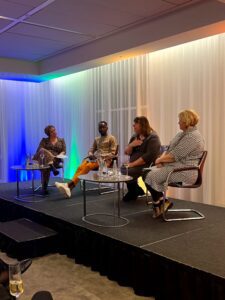
As the U.S. and parts of the liberal world tilt toward far-right extremism, there has been an upsurge in crackdowns across various aspects of global policies, especially health. Oppression, discrimination, and prejudice continue to rear their ugly heads. In America, Donald Trump has dismantled Diversity, Equity, and Inclusion (DEI) initiatives, forcing companies to roll back liberal policies in the UK, and the Labour Party has cut its commitment to international aid when it is most needed.
This shift highlights how human rights are disposable tools for capitalist ventures to profit from when it’s convenient. Across Europe and the U.S., there has been a growing resistance to leftist ideologies. Meanwhile, in Africa, the fight for human rights policies still has a long way to go, leaving many vulnerable people to systemic oppression, discrimination, and prejudice.
The crackdown on the U.S. Agency for International Development (USAID) raises an urgent question: “How many people will need to die before the impact of these cuts is measured and quantified?” USAID has slashed funding for many Non-Governmental Organisations and UN agencies, particularly those providing critical health supplies for LGBTQ+ people, such as antiretroviral therapy (ART) and pre-exposure prophylaxis (PrEP), both essential for HIV care reduction and preventive measures. In Nigeria and several other countries in Africa, NGOs have had to suspend various health services indefinitely, leaving vulnerable individuals at the most considerable risk.
For years, the U.S. has been a major funder of global health, especially in Africa. Malaria, a major global health issue, has received massive funding from USAID. While much of its funding has been halted, the consequences could be devastating in the coming years. The fallout could leave many countries struggling to manage outbreaks. COVID-19 showed that many nations lack enough infrastructure to handle public health crises, and the USAID’s cuts will only exacerbate these loopholes.
More than 2,000 malaria cases are reported annually in the U.S., and most of them are travel-related. The USAID funding cuts mean that there will be a slow response to malaria in rural communities that have benefited from these programmes. Unless the U.S. government plans to completely restrict its citizens from interacting with people from other countries, closing borders for official business and trade, the aftereffects could be heinous. Over the years, these aid programmes have been crucial for survival and have helped in sustaining health institutions. USAID has played an important role in providing preventive infrastructures, medical equipment, and food, sourced from the United States, despite far-right extremists’ claims. The act contributes to the American economy.
USAID-funded projects have supported DEI initiatives in various African countries where anti-gay laws, relics of colonialism, and religious influence thrive. These funds have been crucial for displaced people seeking HIV medication, therapy, and shelter to help them live. The crackdown on LGBTQ+ rights in countries such as Nigeria means that many can no longer rely on hidden NGOs to provide safe spaces where they can access these life-saving resources. The funding cuts have forced many organisations to cease their operation, leaving individuals in urgent need in distress. Other global health efforts, such as malaria prevention, have significantly declined and could reverse these gains, leading to potentially irreversible damage.
This foreign aid goes beyond supporting LGBTQ+ communities in Nigeria, also helps women with sexual health and reproductive rights needs, and provides poor children in the Global South with essentials such as food, healthcare, and education. Trump’s crackdowns have led to a loss of jobs and triggered broader economic consequences. For years, global health efforts have been advancing and striving to achieve UN health goals, but these setbacks could cause irreparable damage, undoing years of progress by activists. If drastic measures are not put in place, the long-term impact could be devastating, making it difficult to rebuild what has been lost.
There is currently evidence of aid cuts across NGOs in Nigeria, creating a crisis that could spiral further and ruin things. While foreign aid remains critical, private sponsors also have a role to play in supporting sexual health and reproductive rights. However, many private sponsors in the Global South shy away from supporting these issues due to their sensitivity to their association with colonial religious beliefs in upholding conservative societal morals. As inflation worsens in Nigeria, young girls are struggling to afford menstruation hygiene products, yet barely any organisation supports them. Instead, these Nigerian institutions are prioritising leadership and mentorship of women’s programmes for “classed” women who do nothing but bridge social inequalities. If girls, women, and LGBTQ+ people are given accessible healthcare rights and full autonomy over their bodies, they will have a far greater chance of thriving.
